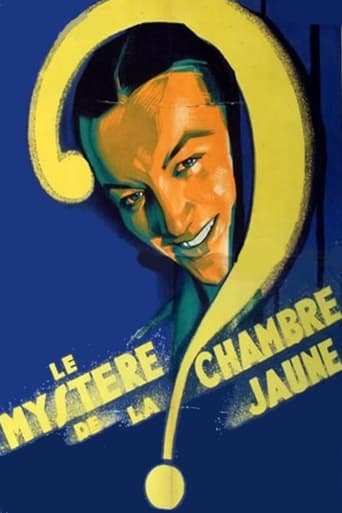dlee2012
In France, Leroux's "Mystery of the Yellow Room" is more popular than his "Phantom of the Opera", (the latter appealing more to Anglo-Saxon audiences). This popularity is evident in the number of film and television adaptations that have been made of this classic "locked room" mystery.Unfortunately, this 1930 attempt at realising the story on the screen is not a particularly successful one. The director is not exploring the capabilities of cinema to any great extent: this is filmed like a stage adaptation, with mundane cinematography, limited sets and a very stilted acting style, even compared to other French films made in the same year, such as "Prix de Beauté.Lending further to the "filmed play" feel of the work is the fact that there is no musical score. Instead, we simply have drawn out scenes of dialogue with little or no tension and a seemingly interminable conclusion.Leroux's dramatic work deserves better than this, which would have seemed dated even on initial release compared to other films coming out of France and Weimar Germany during that period.
writers_reign
Marcel L'Herbier had been grinding out movies since 1917 so that by the time the 'talkies' arrived he knew a lot more than just which way to point the camera. He made three other films in 1930 and I'm betting plenty of twelve-to-seven the others are long gone but not too worry because there's lots to admire here, not least the atmospherics he conjures effortlessly out of nothing. It's only to be expected that acting of that vintage will be a tad mannered but once we get past that we can pay more attention to where he places his camera, the clever play of black and white and the re-telling of an old war horse - it had been filmed as long ago as 1912 and there would be more to come, the latest in 2003 - so that it appears new-minted. Definitely worth a look.
dbdumonteil
Gaston Leroux was one of the best writers of detective stories and his "yellow room" is an interesting case of murder in an enclosed place.Unfortunately this movie was made at the beginning of the talkies and we can feel it.Huguette Duflos's playing seems histrionic and ludicrous today.On the other hand,Roland Toutain,who was to serve as a foil to romantic young leads (notably Jean -Pierre Aumont in "l'équipage" and "la porte du large" ) ,before playing a prominent part in Jean Renoir's "the rules of the games" at the end of the thirties,is perfectly cast as Rouletabille ,Leroux's equivalent of Poirot or Holmes.Leroux's novel was a two-part story.The second part,"le parfum de la dame en noir" was filmed with the same cast the following year.It's more melodramatic ,and Rouletabille will learn a lot of things about his mysterious birth.


